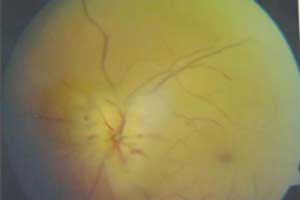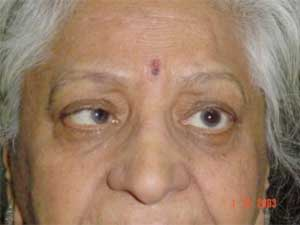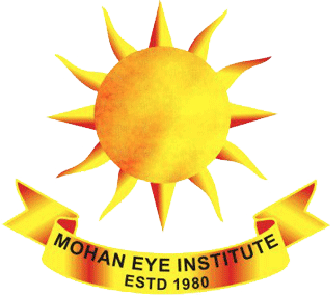Optic Nerve
The visual signals are sent from the eyes to the brain for interpretation via optic nerves.
Common neuro-ophthalmology disorders are:
- Optic neuritis (inflammation of the optic nerve)
- Anterior ischemic optic neuropathies (decreased blood supply to the optic nerve)
- Papilledema (optic disc edema)
- Cranial nerve palsies
- Pituitary tumours
Evaluation:
- Perimetry-Visual Field Assessment
- OCT of the Optic Nerve
- MRI scan or CT scan of brain and orbit
- VEP – Visual Evoked Potential
- ERG – Electro-Retinogram
- EOG – Electro-oculogram
Anterior ischemic optic neuropathy (AION)
AION is caused when there is a reduction of blood supply to the optic nerve resulting in damage to all or some part of it. It is a painless stroke in the optic nerve which leads to swelling. As the swelling subsides, some of the nerves may be permanently lost.
Symptoms
- Sudden, painless decrease in vision or total loss of sight
- Difficulty seeing above or below the center of gaze (peripheral vision)
Causes
- Inflammation of the blood vessels (Giant Cell Arteritis)
- Sudden drop in blood pressure (following an operation or associated with blood loss after an accident)
- Small optic discs
- Smoking
- Diabetes
- Hypertension (high blood pressure)
- High Cholesterol
Optic Neuritis
Optic neuritis is inflammation of the optic nerve which leads to optic nerve swelling.
Symptoms
- A sudden diminishing of sight or severe loss of sight.
- Diplopia (Double vision)
- Abnormalities of the pupil (slow reaction, the difference in the size of the pupils)
- Difficulties in identifying colours or differentiating between them
Causes
- Idiopathic (unknown cause)
- Autoimmune disease – multiple sclerosis is most commonly associated with Optic Neuritis.
- Ocular Infections
Papilledema
In Papilledema, high pressure inside the skull can cause problems with vision and headache.
Symptoms
- Slight diminishing of vision
- Diplopia (double vision)
- Abnormalities of the pupil (slow reaction, the difference in the size of the pupils)
Causes
Raised Intracranial Pressure: It may occur due to space occupying mass in the brain, or increased fluid. This pressure is transferred onto optic nerves producing the swelling seen at the disc (papilledema).
Cranial Nerve Palsy

Cranial Nerve Palsy is when the nerves that supply blood to the muscles of the eyeball that are responsible for eye movement get paralysed. This is one of the most common causes of acute double vision in the older population.
Symptoms
- Diplopia (Double Vision)
- Squint
Causes
- Diabetes
- High blood pressure
- Compressive masses in the brain
- Infections, inflammation or injury of the cranial nerves.
Pituitary Tumours
Pituitary tumors are non-cancerous overgrowth of cells of the pituitary gland in the brain. An increase in size of a pituitary tumor there will lead to compression of the optic nerves and the optic chiasm. Due to this compression, there will be vision defects.
Treatment
- Treating underlying conditions: Often, treating the underlying cause of a neuro-ophthalmic condition like blood pressure and diabetes is the best way to restore or maintain vision.
- Medication: Many neuro-ophthalmic conditions are treatable with medication and steroid therapy, both oral and intravenous.
- Lifestyle changes: Dietary changes and sleep adjustments can sometimes help cure or control neurological conditions.
- Eye patches: Double vision may be treated acutely with patching either eye.
- Surgery: We prefer to use conservative treatments whenever possible. However, when medication or other options are ineffective, surgery may be recommended.
FAQs
Many people suffer from vision disorders as they get older, is it a part of normal ageing?
As we hit age forty, it starts becoming tough for our eyes to move the natural lenses and thus it gets difficult for the eyes to focus. This condition is presbyopia. You need to seek an eye specialist and get your eyes treated.
What happens during the tests conducted for neuro-ophthalmology treatment?
Before starting the treatment, you will need to undergo comprehensive eye tests.These tests will take anywhere from a few hours to over a day. Your neuro-ophthalmologist will take down details about your entire medical history, previous hospitalizations, surgeries, etc. He will go through your scans and review records before arriving at the diagnosis.
Are neuro-ophthalmology disorders fatal?
Some neuro-ophthalmology disorders are not worrisome, while some conditions can lead to vision loss and can be life-threatening as well. At times, these can be confined to the optic nerve or the nervous system. Neuro-ophthalmologists have the ability to diagnose patients from ophthalmologic, neurologic, and medical standpoints.
What is steroid therapy?
Steroids are synthetic drugs that are often given to treat various inflammatory conditions and diseases, under medical supervision. Steroid therapy aims to stop the inflammatory phase of thyroid orbitopathy and shrink the muscle swelling. Side-effects of steroids are evident with continued treatment. Keep your neuro- ophthalmologist informed if you notice any changes.
The steroids made my eyes much more comfortable. Can I just continue taking them?
Steroid therapy, while effective, has side effects that are very common with continued treatment. After steroid therapy, if there are still problems with eye movements (double vision), exposure problems (irritation and foreign body sensation), or decreased vision then surgery should be considered.

